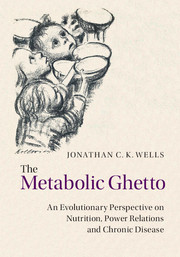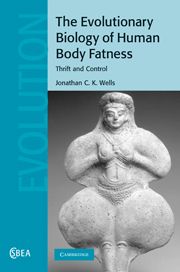The Metabolic Ghetto
Chronic diseases have rapidly become the leading global cause of morbidity and mortality, yet there is poor understanding of this transition, or why particular social and ethnic groups are especially susceptible. In this book, Wells adopts a multidisciplinary approach to human nutrition, emphasising how power relations shape the physiological pathways to obesity, diabetes, hypertension and cardiovascular disease. Part I reviews the physiological basis of chronic diseases, presenting a 'capacity-load' model that integrates the nutritional contributions of developmental experience and adult lifestyle. Part II presents an evolutionary perspective on the sensitivity of human metabolism to ecological stresses, highlighting how social hierarchy impacts metabolism on an intergenerational timescale. Part III reviews how nutrition has changed over time, as societies evolved and coalesced towards a single global economic system. Part IV integrates these physiological, evolutionary and politico-economic perspectives in a unifying framework, to deepen our understanding of the societal basis of metabolic ill-health.
- Proposes a novel broad synthesis of human nutrition and chronic diseases that will appeal to those looking for societal rather than technical solutions to the leading cause of human mortality in the modern world
- Integrates perspectives on physiology, evolutionary biology and societal causes of inequality, and provides a unifying framework to draw together these disparate areas of research
- Avoids mathematical treatment and scientific jargon to ensure the content is accessible to both biomedical and social scientists
Reviews & endorsements
'Is it really possible to bring together philosophy, economics, history, evolutionary biology, epidemiology, nutrition and metabolism to understand obesity and chronic disease? Jonathan C. K. Wells has done it in an immensely readable and insightful way. A wonderful book.' Michael Marmot, University College London
'No other book before has provided such a sophisticated and eloquent argument integrating knowledge about foetal and childhood environment and nutrition, with impacts of social, economic and historical factors. Jonathan C. K. Wells persuasively argues that a broad scope and an evolutionary framework are necessary to build our understanding of chronic and globally important diseases. Consequently, [he] succeeds in achieving a true consilience of very disparate perspectives on our health.' Grazyna Jasienska, Jagiellonian University, Poland
' [T]his book is a sobering look at how social hierarchy can undermine the health of the lower-ranked within a society and within the global economic order. A significant strength of the book lies in the variety of perspective and conceptual models evaluated. … It is an ambitious book that tackles big questions …' Darna L. Dufour, American Journal of Human Biology
'The Metabolic Ghetto is both a scholarly book and a call to action. Wells's arguments are carefully presented and well documented … Readers who are interested in the ways in which social structures affect health and who would like to understand the central role of nutrition in mediating the effects of socioeconomic inequalities on health will learn much from this book. Readers who are interested in global health will especially welcome Wells's international perspective and his concern for the health of people in low- and middle-income countries as well as for those in economically advantaged societies. … the readers who will be most attracted to the book are those who, in Marx's words, believe that the task of natural philosophers is not only to interpret the world but to change it.' Robert L. Perlman, American Journal of Physical Anthropology
Product details
August 2016Adobe eBook Reader
9781316680049
0 pages
0kg
187 b/w illus. 27 tables
This ISBN is for an eBook version which is distributed on our behalf by a third party.
Table of Contents
- Preface
- 1. Introduction
- Part I. The Physiology of Chronic Disease:
- 2. Models of chronic disease
- 3. Links between nutrition and health
- 4. The developmental origins of disease
- 5. Life-course models of chronic disease aetiology
- 6. Applying the capacity-load model
- Part II. An Evolutionary Perspective on Human Metabolism:
- 7. Life history strategy
- 8. Ancestral environments
- 9. The evolution of human adaptability
- 10. Sensitivity in early life
- 11. The evolutionary biology of inequality
- 12. The metabolic ghetto
- Part III. A Historical Perspective on Human Nutrition:
- 13. The emergence of agriculture
- 14. Trade, capitalism and imperialism
- 15. Hierarchy and metabolic capacity
- 16. The emergence of consumerism
- 17. Enforcing obedience
- 18. The dual burden of malnutrition
- Part IV. Power, Nutrition and Society:
- 19. A series of games
- 20. A question of agency
- Epilogue
- Index.







